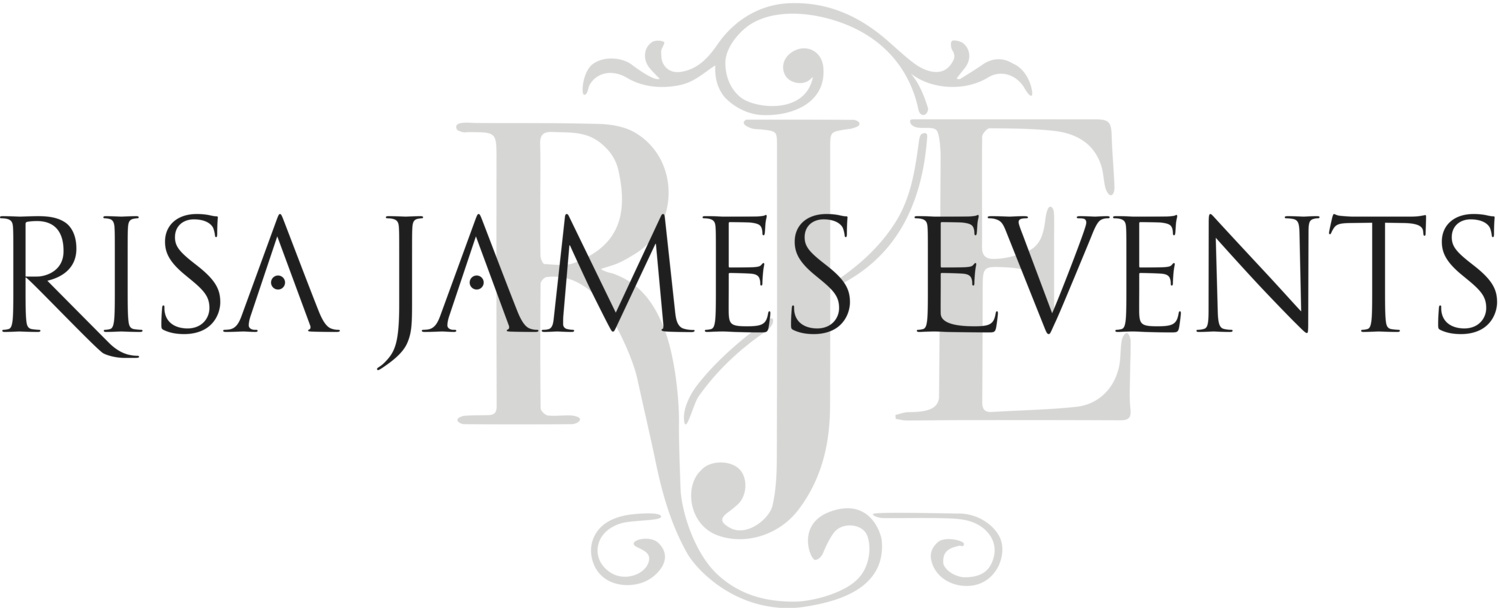As a wedding professional, I'm asked a lot of pretty random questions. I'm sort of a human Google in that regard. In this Q&A Grab-bag, I'll share some recent questions and answers, updating it periodically as I get new questions.
Q: Do I have to send separate invitations to all my cousins?
A: It depends. If your cousins live at home or are in college (and therefore their permanent address is still their parents' house), then you can include them in the invitation to your aunt and uncle. If your cousins are old enough to have their own domiciles, then you must send them their own invitations.
Q: Who gets a plus-one?
A: People who are married, engaged, or living together must be invited with their partner. If you know one of your guests is in a long-term relationship but the couple doesn't live together, it's thoughtful and polite to invite both parties if your overall guest count can accommodate it. You only need to send one invitation, but on the inner envelope you can write "Jane and Steve" to indicate that the significant other is welcome. (If you're not using inner envelopes, just include a short note saying that you look forward to seeing both parties at the wedding if they're able to attend.)
Q: When do we cut the cake?
A: Whenever you want! Seriously. It used to be common to cut the cake after dinner was finished, but it's becoming more common to cut the cake at the beginning of the reception, especially if the couple performs their first dance immediately after their grand entrance. This approach has three advantages: 1) everyone is already paying attention, 2) it doesn't interrupt party-time dancing later in the evening, and 3) cake can be served very soon after dinner finishes, as opposed to having to wait for staff to finish cutting the cake and plating it after the cake-cutting spectacle. Whichever option you prefer, just go with it!
Q: Do we have to have a first dance?
A: You don't "have to" do anything. It's your wedding, do what you want! If you're not comfortable dancing or being the center of attention, skip the dance. It's not worth stressing over. You want to have fun on your wedding day!
Q: How involved in choosing my gown does my future mother-in-law get to be? She doesn't have any daughters, and my fiancé is pushing me to let her go shopping with me, even though our tastes are wildly divergent.
A: This one is tricky because you don't want any hurt feelings. Ultimately, it's your wedding and your dress, so you should choose the one you like best and feel best wearing. That said, there's no harm in letting others provide input along the way. You're under no obligation to heed any advice, but it's polite to accept it anyway. You will probably spend more than one day trying on dresses. You don't have to include your future mother-in-law in every try-on experience. If it's logistically possible, asking her to join you for one or two salon visits will let her feel included. If you don't live in the same city, then sending a few text photos of your favorite contenders will allow her to express her thoughts and opinions, and then you can move on with your life.
Q: When should I send thank you notes for gifts we receive before the wedding?
A: When you receive the gift. Some people will wait until after the wedding to send a gift (generally speaking, wedding gifts can be sent up to a year after the wedding, and your registry will stay active for 6-12 months after your wedding date). Those thank you notes should be written as soon as you receive the gift (but definitely within three months of receiving the gift). For gifts, including cash, you receive at your wedding, thank you notes should be written immediately upon returning from your honeymoon (or immediately after the wedding if you're not taking a honeymoon). Any gifts sent earlier than the month of the wedding should be acknowledged as soon as you receive them. That way the sender knows that you received it, and you have one less thing to do after the wedding! You should keep a notebook or spreadsheet of each gift, who the sender was, and when your thank you note was sent. Also, weddings require hand-written, paper thank you notes. No phone calls, emails, or texts!
Q: Do I need to have separate response cards for all of my wedding weekend events (welcome dinner, wedding, day-after brunch)? Or can I assume if someone's coming to the wedding, they're coming to the other events too?
A: Never assume anything. If your wedding weekend has multiple events, you will want guests to respond to each event individually. You can accomplish this in one of several ways. The most formal option is to include separate invitations and response cards for each event in the envelope with your wedding invitation. (You can combine, say, a welcome dinner and a brunch on the same response card, but be sure to include separate lines for each event in case your guests can attend one but not the other.) Another, less formal, option is to include an insert about the ancillary events with the wedding invitation, but invite guests to respond on your wedding website or via an email address (or phone number, if you have a lot of elderly, non-Internet-capable guests). The least formal option is to only have a wedding website, which you provide to guests via the Save-the-Date cards, and you manage all responses through the website. I don't recommend this approach both because it is too informal for a wedding and because many people are used to receiving invitations in the mail.

